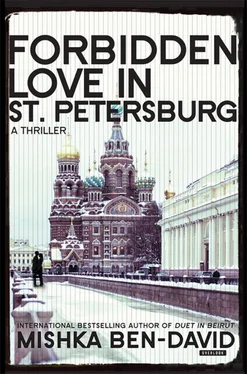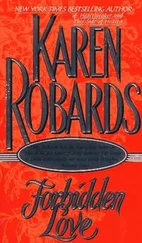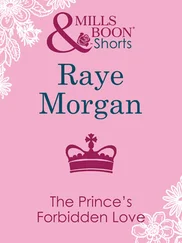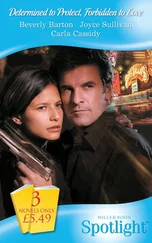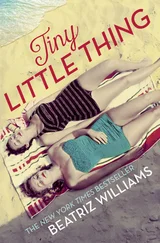Yoav left Harry to keep an eye on the shop. He himself walked past it, convened the team for a meeting at McDonald’s on the corner of Sredni Prospekt and reported back to Israel. Following the departure of Boaz and his men from the city at the end of a week’s work, Yoav, a relatively young team leader, was the most senior commander left on the ground.
The news of my having been found spread rapidly within HQ. In a hurried consultation between Udi, Levanon, and the head of the Mossad, it was decided to give preference to discovering my favourite haunts before any attempt was made to approach me directly. That way, were I to disappear following such an approach, they would know where to begin looking for me again.
OK guys, this has been easier than we thought it would be, Yoav told his men. Fortunately, there is a match between the information Roman gave us and what Harry saw, and that saves us from having to expose ourselves to the subject. To Paul, he corrected himself. According to the most recent instructions from HQ, we are to follow Paul and Anna who, I assume, is the woman with him in the shop. Our objective, as has just been re-stated, is to find out where their apartment is and other haunts of theirs, if any, learn their routine and, most importantly, discover who their contacts are. Who they meet, when and where. We also need to get photographs of Anna.
Wouldn’t it be worth it if someone who actually knows him could give us a positive ID? asked Debbie, one of the female members of the team. Harry, after all, only remembers him from the picture, from the briefing by intelligence.
You’re right, and that’s why I’m now going to join Harry at the lookout point. In our team you, Harry, and Rosy, don’t know him at all. You’ll also be the ones who’ll keep tabs on him when he goes out. Guri, Nadav and I, will tail the woman.
From now on I want two cars in the close vicinity of the bookshop, one for each team of operatives. Debbie, you’re in charge of the team following Paul; Guri, you’re responsible for those tailing Anna. There’s a Sbarro pizzeria and a Coffee House opposite the shop, two good vantage points. Vehicles can’t, of course, enter this street, but there are parking places in Bolshoi as well as in Sredni. In both these streets there are also buses and there is a metro station on the corner of 7 thand Sredni. We don’t know yet how they move around so get yourselves bus and metro passes.
Debbie and Guri went to rent cars. The rest of the team set off to take up their positions opposite the shop.
Anna and I were becoming accustomed to our blissful routine. Just before nine in the morning we’d leave our apartment and a short while later open the shop. At about 1 p.m. one of us would go out to eat and an hour later the other did the same. At five we closed the shop. To enjoy the city’s festive atmosphere, now at its height, we went twice to a Balkan restaurant that Anna loved and on another evening to the monthly Philharmonic concert. Anna was able to exchange both the series and the seating she previously had. I don’t want to hear all that gossiping around us, she explained.
Before the concert, the excited Anna took me to the Conservatoire building opposite the Mariinsky Theatre. Right at the entrance we were engulfed by the sounds of singing and playing coming from the rooms along the corridor. We went up an elegant staircase and with much enthusiasm Anna showed me the classrooms she’d studied in and the grand piano in one of the halls on which she’d practised on ‘countless evenings’. Her excitement was so great that we were very nearly late for the concert.
On the evenings we didn’t go into town we strolled along the strip of neglected shoreline between Morskaya Street and the sea, sat on the steps of the jetty surrounded by graffiti and beer bottles left by youngsters–who probably made their appearance there much later on in the evening–and stayed until the bitter cold chased us back into our apartment and bed.
Yoav reported our precise routine to HQ, along with his impression that we were indeed running a legitimate bookstore. He hadn’t seen any suspicious-looking people coming in or out, nor had he noticed any questionable meetings taking place there. Team members had followed both Anna and me to meals, and observed that we ate alone.
To their credit, it has to be said that I didn’t see them or suspect them in any way. When for the second or third time I ate at Sbarro opposite the shop, I knew that I had already seen the two young women sitting at the far end of the Italian restaurant, but that was also true of other diners. On the short bus ride to the shop in the morning I saw nobody suspicious–they might have been following us in a car–nor did I see anyone on the way home when the mists of evening had already gathered.
In retrospect, I was glad that I’d spoiled them with meals at the Balkan restaurant. On the evening of the concert the poor souls must have frozen in the cold outside the Conservatoire and when they stood waiting at the various exists from the Meriinsky Theatre from where, presumably, they followed us home.
At Christmas, Anna asked me if I wanted to get a Yolochka , a Christmas tree. I loved learning the Russian words that Anna slipped into our conversations whenever the right English term escaped her. I said that it made no difference to me. As the son of a Hindu father and a Christian mother such aspects of religious festivals were no part of my life.
Anna, nevertheless, went ahead and bought a miniature tree, placed it in the corner of the living room and decorated it. I bought her two nightdresses and a silk robe which I wrapped and hid until Christmas Eve, when I placed the parcel by the tree. Anna happily produced her present to me–a white designer shirt. She thought it was high time I dressed like a real businessman even though I was now turning myself into a salesman in a bookstore. This was a flaw in me that even my instructors in the long training course at the Mossad had failed to correct; as a villager who throughout his childhood saw the people around him wearing only working clothes, I hadn’t got used to the attire of a businessman. When I did wear a suit and tie because there was no other option, my controllers found themselves having to comment on the black trainers that I was wearing.
Anna wanted to go to midnight mass and asked if I wished to join her. If you’re going I’ll come with you. I’m an atheist it’s true, but an atheist in love.
Anna kissed me. How can the son of a Hindu and a Catholic be an atheist? she wanted to know.
Precisely as a result of that, I replied. Two contradictory truths led me to a reliance on science.
But every scientific theory that tries to explain the world is full of holes, she said. The expansion of the universe doesn’t necessarily point to a big bang. And do you know why the big bang theory was accepted? Because the Russian scientists who thought that the galaxies simply passed one another and were now drawing away, didn’t have the money to come to the West and make their views heard.
Before I’d even managed to voice my reservations about that, Anna quickly continued. Theories about the formation of life from simple chemical substances, such as the Miller-Urey experiment, though based on the work of a Russian scientist and his student, only explain how life could have been created if the substances used in the laboratory were also present in the same proportions in the ‘primordial soup’.
I wondered whether communist education hadn’t, after all, damaged her in some way.
When Anna also argued against Darwinism, claiming it pushed Lamarck’s theory aside, I asked if Lamarck had also been a Russian and Anna silenced me by pushing her tongue deep into my mouth.
Читать дальше
